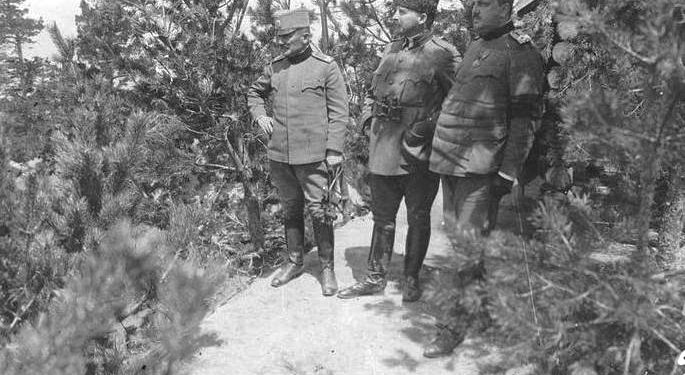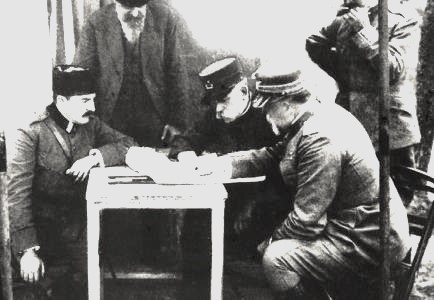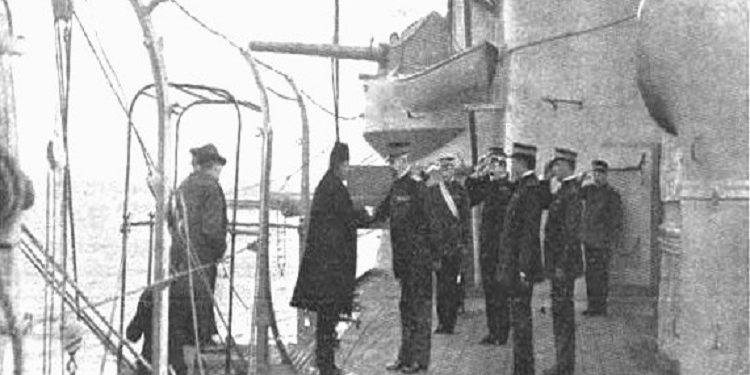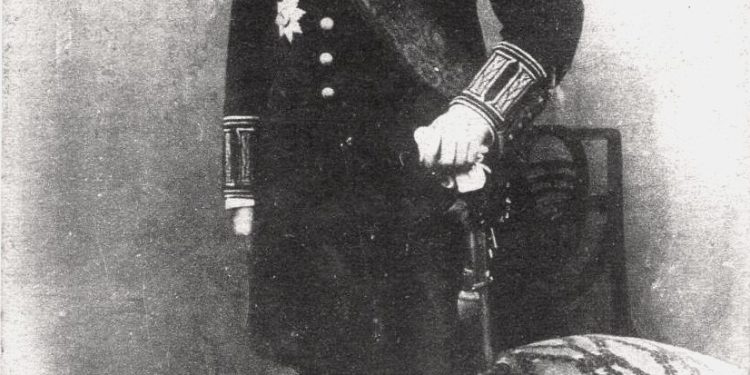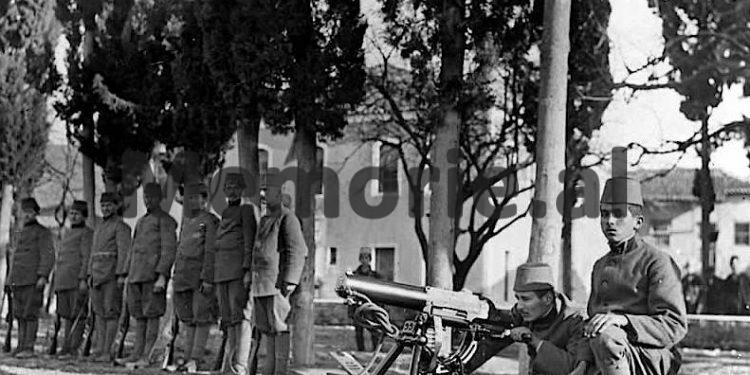Part One
Albanian-Serbian relations, in light of the most recent Serbian archival documents
Memorie.al/ For the first time, one of the most talked about and stigmatized Albanian political figures of 20th-century historiography and politics, Esat Pashë Toptani, has now been “deconspired” by official Serbian historiography. This is revealed in Volume II by the authors Ljubodrag Dimić and Gjorgje Borozan (academic historians), titled “The Yugoslav State and the Albanians,” offered exclusively by the “Yugoslav Military-Historical Institute,” published in September 1999.
Esat Pasha has been placed, with a paradoxical spread, across the entire spectrum of political-historical criticism, both official and unofficial. He was labeled everything from a “great patriot” for his “merits in defending Shkodra from the Montenegrins during the Balkan War in 1913,” to the “most monstrous traitor who sold Albania and served its enemies.” He has been publicly identified as an ally and collaborator of the Serbs and the Great Powers of the Entente, who emerged victorious during World War I. This includes the official correspondence he exchanged with the highest politicians of Serbia and the Versailles Yugoslavia in the second decade of the last century.
Adored and hated at the same time by his followers and opponents, he was valued as a politician and military strategist by:
- The Turkish Empire
- The proclaimers of Independence and founders of the Albanian state on November 28, 1912, who appointed him Minister of Defense in the government of Ismail Qemali
- Prince Wied, who appointed him Minister of War
- The Italians and Serbs in 1914-1916, who declared him an ally and decorated him
- The English and French, who also declared him an ally and decorated him
- The Albanians who declared him head of the government of Durrës in September 1914 (after the departure of Prince Wied from Albania)
- All the Great Powers, who recognized him as “the legitimate head of a legitimate government” and to whom, upon recognition, the entire diplomatic corps accredited to Prince Wied was attached
- Turkey, which wanted to politically and militarily engage him on its side after the outbreak of WWI
- Austria and Bulgaria, who wanted to attract him as an ally of the Central Block during World War I
- Greece and Tsarist Russia, who officially recognized him and to whom they attached their ambassadors in Thessaloniki during World War I
- Finally, all the united Entente Powers, who declared him an official ally and alongside whom, at the head of thousands of Albanians, he fought on the Eastern Front of Thessaloniki until the end of World War I.
And it was precisely when the victorious Great Powers, and even the defeated, gathered in Paris at the Versailles Peace Conference to divide the spoils, determine colonial and state borders, and decide on benefits and reparations for the winners and losers, that Esat Pasha found himself abandoned and ordered not to set foot in Albania until the great victors of the world and the war determined “the final status of the Albanian state.”
His disappointment was extreme. The “hero,” wooed by everyone, fought by enemies, and decorated by allies, now saw himself abandoned and isolated. He complained to his Serbian friends, reminding them of his great services. He complained to them about the isolation the Italians wanted to impose on him after his “refusal” to recognize and accept the decisions of the Secret Treaty of London of April 1915 (for the partition of Albania among Italy, Yugoslavia, and Greece).
He complained about the French ultimatum, which rejected the accolades and decorations awarded by France during the War and the services he rendered to it as part of the French division on the Thessaloniki Front. He complained about ingratitude, poverty, and material and financial shortages, while others were sharing the glory of the “great victory” and the spoils of war.
He complained that the Yugoslav commission for war reparations only sporadically mentioned his military and financial contribution to the allied cause. And his pain reached a crescendo when he addressed his personal friend, Nikola Pašić, with the words: “Do you want to treat me like a volunteer or a mercenary?”
Forgotten in the “Continental” Hotel, accompanied only by family members and a few officials he considered members of his “legitimate” government, attacked by all the Albanian delegates of all sides and colors in Paris, and threatened with his life by those who had decided to kill him “in the name of Albania and the Albanian people,” he complained as he impatiently awaited the 120,000 francs the Yugoslav government had awarded him as a pension for services rendered over the years.
He felt extremely tired as he distributed the last pennies he had left after “paying the pensions he had arranged” for the families of the Albanian soldiers killed and wounded on the Thessaloniki Front. Esati felt that the door to his homeland had been closed, a homeland he understood and treated in his own way.
He felt eagerly awaited by his supporters in Albania and at the same time betrayed and despised… and he hoped only in Pašić and the Serbs. His political saga is that of all Albanians, who even when they fought for great worldwide victories on the side of the winners, as a reward they received the mandates for the further fragmentation of their homeland.
Esati is Esati. The trajectory of his life partially overlaps with the fates and wars of the Albanians, but the scanner of history, mercilessly, reveals the hidden corners of his life, fate, and last days.
And for this, we are helped by this letter of his addressed to Pašić…, as well as the Serbian archives, which now have no desire or mercy to keep hidden the connections and correspondence that the statesmen of Serbia and the Versailles Yugoslavia had with the man with whom they mutually recalled and appreciated the “cooperation” and “contributions” that, in the end, not only did not serve Albania but, on the contrary.
How Esat Pasha Complained to the Serbian Prime Minister, Pašić
Paris, January 20, 1920
(Private)
My dear Chairman!
I have come to the delegation’s residence (Yugoslavian – A.K.’s note) three times, hoping to meet with you. But in all cases, you were very busy, and I did not have the opportunity to see you.
Nevertheless, I had a long conversation with Mr. Trumbić (the Yugoslavian Minister of Foreign Affairs), who became more or less acquainted with the problem I spoke to him about, and he asked me to establish a regime that would enable me to serve and work for the protection of my interests before the commission (The Commission for War Reparations of World War I, at the Peace Conference in Paris 1919-1921).
I have the honor, on this occasion, to also send you the summarized copy of the problems I have, which will help you understand the reasons that prompt me to meet with you.
You also know my rights well, as do I, but in this world, justice does not win. However, the support you have always given me has been enough to correct the injustices that the Entente Powers have done to me.
But as always, I believe in the promises that His Majesty, the Prince Regent, the royal government, and you personally have given me, that the injustices will be corrected and that they will be thrown away…! But by knowing me as your helper, you know well that my right is clear, that it is and always remain significant in relations with the Entente.
In the various memorandums and in this note that I have brought you, I have spoken about the damages I have suffered during this war. I cannot fail to remind you how my troops, for 4 years, fought against the common enemies, both on the front of Thessaloniki and on the first line of the trenches, 30 kilometers long, fulfilling the duty of the French division.
During these 4 years, all the expenses of my army and government were borne by me. It is true that your royal government has compensated me to the extent of 80%, but up to this aid, everything has been my personal burden, because I have always wanted to help the Serbs, and always, tirelessly, fight for the interests of all the other allies.
They no longer recognize me as their ally, although after this war, I have had no gain, in territories or benefits, as I deserved. On the contrary, I have lost my homeland, as if it were an enemy country.
Under such circumstances, which I consider unfavorable and utterly undignified, your (Yugoslavian) commission for reparations at the Reparations Commission of the Peace Conference refused my proposals and presence. Do you want to treat me this way, as a volunteer, or as a mercenary?
I know that the royal Yugoslavian delegation sent the commission to examine the problems related to war damages and reparations, and that I am also mentioned in its documents, but only sporadically.
The power that will gain the mandate over Albania will certainly raise its voice in favor of the country for which it will be mandated, but this does not give it the right to cast doubts on me and my rights, behaving in a hostile manner towards me and thus causing me the greatest possible damage.
Who will take me under protection now, if you won’t? Please forgive me for bothering you with these problems, but this moment is extremely critical for me, as I feel dependent and I turn to you, my only Serbian friends, for help!
I hope first of all in God, then in you, and I always count on your support, which is the only one that makes it possible to recover and compensate for the damage…!
At the beginning of the (First World) War, a rebellion had broken out in Central Albania against Prince Wied, who, as is known, was forced to leave the country on September 3, 1914.
Understanding the role that my country had to play during this war, I left Paris, where I had been until then, and via Dibra, I returned to Albania, and at the head of 10,000 volunteers, I marched towards Durrës, where I entered without a single shot fired against me, welcomed by the inhabitants and foreign representatives.
The next day, the Senate, unanimously, chose me as the head of the government.
All the Great Powers accepted this choice and re-accredited their diplomatic representatives, who had been previously accredited to Prince Wied.
On the same day that I entered Durrës, the plenipotentiary ambassador of Austro-Hungary, on behalf of his government, asked me to enter the war as an ally of the Central Block and insisted on the acceptance of this offer.
I categorically refused, and in the same way, a few days later, I also refused the offer that, with the same goal, the diplomatic representative of Bulgaria proposed to me./Memorie.al
Head of the Albanian Government




